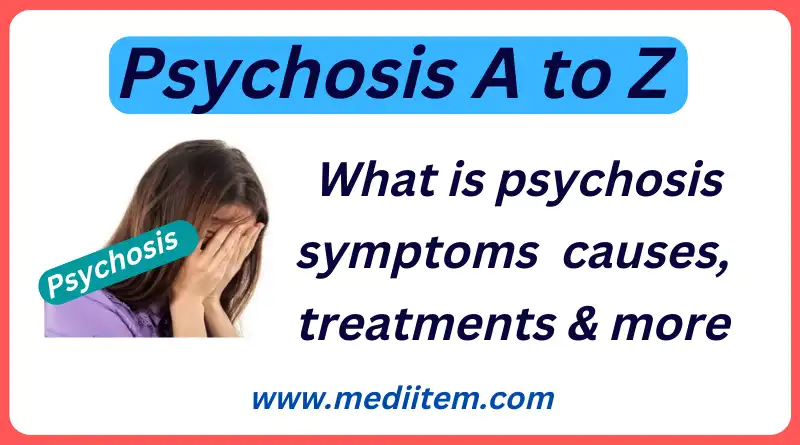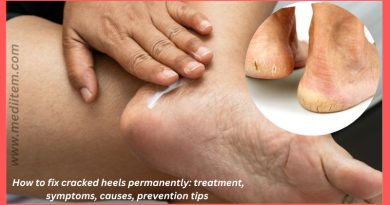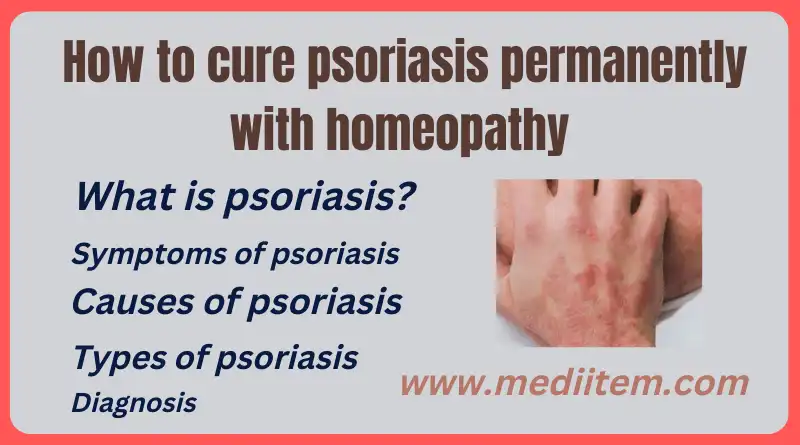What is psychosis symptoms and more information
What is psychosis symptoms are the most important information such as -If we are in the presence of a family member who presents any of these manifestations,
we must go to a specialist immediately, who will immediately carry out physical and psychological evaluations to locate the specific cause.
However, as the causes can vary, the treatment will depend on the presence of some alteration in brain chemistry
or if it is the product of a major depressive state that has not been diagnosed and treated in time or the stage of the disorder.
Main symptoms Appearance of hallucinations are alterations of perception by which a stimulus (auditory, visual, olfactory, tactile, or gustatory) can be perceived without it having actually occurred.
For example hearing voices (insults, criticism, orders, or comments about behavior), without anyone actually speaking.
In toxic psychoses, the psychotic syndrome does disappear when consumption ceases and its prognosis is better if abstinence is maintained.
Psychotic syndromes can also occur in bipolar disorder and in medical illnesses that directly or indirectly affect the brain.
The relationships between schizophrenia and bipolar disorder are evident in the so-called schizoaffective disorders, in which ingredients from both psychiatric syndromes are mixed.
Delusions: the patient thinks that there are people who want to harm or harm him, that they persecute him in the street, or even that his email or mobile passwords have been hacked.
Confused thoughts:– The most common thoughts become confused or lose a proper relationship with each other. Oral expression becomes difficult to understand or does not make sense.
In some cases, it is difficult for the person to concentrate, follow the thread of the conversation or remember things. it your thoughts seem to speed and down and
false beliefs. Frequently the person affected by a psychotic episode has false beliefs, known as delusions.
She is convinced of the truth of the delusion to such an extent that no reasoning, no matter how logical, is capable of undeceiving her.
For example, based on the way cars are parked outside her house, she comes to believe that the police are watching her.
Hallucinations: When they occur as a result of schizophrenia or other more or less similar disorders, such as psychotic depression
or schizoaffective disorder, psychotic symptoms are considered a key indicator of psychopathology.
In affective disorders or dementia, psychotic symptoms are associated with an increase in severity or with the progression of the disturbance.
the patient feels the person sees, hears, feels,
perceives smells sees images and hears voices that are real and that no one else can perceive. They repeat to him that he is worthless or incite him to self-flagellation or attempt against his own life.
she smells or tastes things in such a way that they seem spoiled or even poisoned.
Affective and perception changes. Sometimes the person’s way of feeling changes suddenly, for no apparent reason, causing them to feel strange and isolated from the world and it seems that things move very slowly.
Mood swings are common, and the person feels unusually excited or depressed.
Or, his emotions seem to fade, he feels less than before, or he shows less of his emotions to those around him.
and the same symptoms of negative thinking looking
What is psychosis symptoms information
The term psycho disease is used to refer to those disorders of the mind characterized by a lack of contact with reality.
in the context of great anguish. The term psychosis is used to refer to those disorders of the mind characterized by a certain loss of contact with reality.
When a person suffers from this type of disorder, they are said to have had a psychotic episode.
By deploying the term psychosis we will necessarily link it to psychopathology.
We will define this as the management of psychic pain, with greater or lesser solvency, resulting from contact with reality,
and which is not subsidiarily compensated by the corresponding share of pleasure. Psychosis mainly affects young adults and is quite common.
About 3/4 out of 100 young people will experience a psychotic episode.
What are the causes of psychosis?
The causes are especially difficult to determine, so the person must undergo a thorough medical examination in order to detect possible organic causes and make a diagnosis that is as precise as possible.
In general, this examination involves carrying out various analyzes as well as a detailed interview with a specialist in the area of mental health, since there are many types of psychosis.
The course and prognosis of the disease vary from person to person.
People can suffer from psychosis for different external causes, such as Lack of sleep, genetic causes, substance abuse, medicine side effects Etc.
Although the brain alterations typical of schizophrenia can cause psychotic experiences, these can also be due to other psychological and biological causes.
These include intense stress and fatigue, depression, brain damage, and the use of some substances.
Injuries and diseases:- Brain injuries, as well as brain tumors or other degenerative diseases (such as Alzheimer’s, dementia, or HIV), can trigger certain psychotic symptoms.
Trauma: The death of a loved one as well as having suffered a sexual assault or a very traumatic event can cause a person to suffer from a psychotic break.
What is psychosis symptoms vs schizophrenia?
What is psychosis symptoms differences between psychosis and schizophrenia-
Psychoses result from alterations in various brain circuits in vulnerable people and the most characteristic is schizophrenia, which occurs in 1% of any human population.
In summary, “psychosis” and “schizophrenia” are two closely related concepts, but schizophrenia is a mental disorder with specific diagnostic criteria,
while psychosis is a group of symptoms that can occur because of schizophrenia or because of it.
Schizophrenia is the quintessential mental illness and has a chronic course -that is, it conditions biography- above all due to the cognitive deficits it entails.
Sometimes, schizophrenia manifests itself as a result of stressful events or as a result of the consumption of toxic substances (in particular, cannabis),
and once expressed, it follows its natural course, even if the consumption of substances ceases.
Psychic pain is central to understanding the psychotic issue. Psychic pain comes from contact with reality; during the development process,
tolerating it can be achieved with the aim of modifying it, either by oneself or with help; the baby awaits the presence of the mother so that when she is hungry she feeds him,
fulfilling the modification of reality that until then was unpleasant by which she becomes satisfactory, balancing herself and inaugurating the displeasure-pleasure system.
At other times it may happen that due to the demanding power of the biological demand, or due to external issues such as the environment
(the mother) not responding to the baby’s demand or also that its presence is late, then the avoidance of that reality because it is unbearable.
Homeopathic psychosis miasma
The productive miasmatic predominance in an apparently healthy subject is called latent psychosis, which becomes manifest when productive symptoms predominate in acute processes.
Bacterial cocci, due to their rapid proliferation, are closely related to this type of miasm. This is also produced by the destruction of red blood cells by imperfect oxidation.
The imbalance of excess is designated, it is produced by inadequate or late treatments,
which only hide the symptoms without allowing nature to try to restore balance first. Fig-like condylomatous hyperplasia is a slow but progressive onset condition.
People have a depressive temperament, with a tendency to hydrosaline retention such as cellulite and the symptoms aggravate with humidity and cold.
***Mental symptoms:- perversion, extroversion, emotional affectivity, for example, anger, aggressiveness, selfishness, mistrust, falsehood,
jealousy, excessive ambition, and hatred, as well as egomania, screams, and screams when angry, cat dreams, he is fanciful, fickle, petulant, capricious,
obsessive, detail-oriented, with proliferating, ceremonial fixed ideas; he is laborious, talkative, and his pains are like his mental symptoms, stabbing and unbearable.
What is psychosis symptoms in homeopath diagnosis
*It is associated with the color yellow, happy, bright, and hyperfunction.
*Deep tropism, hyperplasia, hypertrophy, alteration of functions due to excess proliferation of normal tissue, deformation.
*Neurotic syndrome, the individual is obsessive, ambitious, hasty, ostentatious, and tends to suffer for small damages.
*Tendency to water retention, sinusitis, otitis, excessive menstrual discharge, and gonorrhea.
*Aggravates in the afternoons and at midnight, barometric drop with wet weather (dew, fog, rain, and snow).
*Improvement with pathological eliminations, such as vaginal, urethral, and catarrhal, or through the appearance of excrescences, dry heat, and movements.
*Aversions to meats, fats, and alcohol. Desires: vegetable oils and proteins, legumes, fresh fruits, and cereals.
*The patient is extroverted, fickle, and fanciful, with active memory.
*Produces benign or malignant tumors in any part of the body (inflammation, warts, polyps).
***Exonerative catarrhal:- catarrhal discharge, musty odor, non-physiological, that does not improve, spasms and shooting pain, neuralgia, in small areas, in addition to discontinuity.
***Neoformation:- articular rheumatism, crunches when sliding the bones, unhealthy appearance, earthy, shiny, infiltrated skin, thick and hard nails with deforming striations,
tumor formations, papillomas, hemorrhoids, prostatic hypertrophy, calluses, varicose veins, cysts, dropsy, anasarca, excessive sweating, mainly on the forehead, hands, and feet.
What is psychotic behavior?
What is psychotic behavior changes. people affected by psychosis present different behaviors than they usually have.
In some cases, they become extremely active, or they become extremely lethargic and do nothing all day.
They burst out laughing at inopportune moments or get angry or upset for no apparent reason. Many times, these behavioral changes are related to the symptoms listed above.
For example, if the person believes that she is in danger, she calls the police, or if she believes in Jesus Christ, she spends the day preaching on the streets.
In other cases, he stops eating for fear that the food is poisoned or has trouble falling asleep because he is afraid of something.
They are pessimists, Their eating patterns are altered, and they may suffer from anorexia or binge eating disorder. They become sensitive, irritable people, and everything annoys them.
The tendency of their conversations is toward the negative, they express the desire not to continue living, the uselessness of their existence, and/or their little value.
The sleep pattern is also altered: they sleep a lot or have long episodes of insomnia. Social and family activities no longer interest you and chronic fatigue can be observed.
What is psychosis symptoms types?
Organic psychosis:– Sometimes psychotic symptoms appear as a result of head injuries or organic diseases that affect brain function, such as encephalitis, AIDS, or a tumor.
In these cases, other symptoms, such as amnesia or confusion, usually occur along with the psychosis.
Bipolar disorder (manic depression)- In bipolar disorder, the psychosis presents as part of a more generalized affective disturbance,
characterized by violent alternations between high excitement (mania) and melancholia (depression).
If psychotic symptoms occur, they usually correspond to the person’s state of mind: for example, if they are depressed, they hear voices telling them to commit suicide,
while if they experience abnormal excitement or euphoria, they believe they are exceptional being capable of performing great feats.
Schizoaffective disorder- This diagnosis corresponds to the simultaneous or consecutive presence of both symptoms of affective disorder (such as depression or mania) and psychosis.
That is, the clinical picture is not typical of either affective disorder.
Psychotic depression:- It consists of acute depression combined with psychotic symptoms,
without periods of mania or excitement occurring at any time during the illness, which is why it is distinguished from bipolar disorder.
Drug-induced psychosis:- Drug or alcohol use, as well as withdrawal after prolonged use, can cause psychotic symptoms.
In some cases, the symptoms resolve rapidly as the effects of the substance wear off, while in others the illness, although it began as a drug-induced psychosis, becomes more prolonged.
Schizophrenia:- The term schizophrenia is used to refer to those psychotic illnesses in which behavioral changes or symptoms persist for a period of not less than six months.
Both the symptoms and the duration of the disease vary from case to case, and contrary to popular belief, many people with schizophrenia lead full and happy lives, many of them achieving full recovery.
Psychotic disorders symptoms
What is psychotic disorders symptoms are the most important such as
Schizoaffective disorder
This disorder is characterized by the presence of psychotic symptoms together with changes in mood
such as depressive or manic episodes, with psychotic symptoms existing for at least two weeks in the absence of manic or depressive episodes.
Medicine substance use
Drugs can also generate psychotic-type experiences, both at the time of consumption and during intoxication or as a result of withdrawal syndrome independent subjects.
Psychotic Disorder
Some medical illnesses can end up generating psychotic symptomatology due to the affectation of the nerves or the brain.
Dementia, tumors, autoimmune problems, and metabolic disorders can be the origin of organic psychosis.
Delusional disorder
Another of the great psychotic-type mental disorders, chronic delusional disorder is characterized by the existence of alterations in the content of thought,
with strange beliefs that do not conform to the reality that remains fixed despite evidence to the contrary.
In general, with the exception of what is linked to the content of his delusion, the subject acts normally and does not present other difficulties.
The beliefs can be more or less systematized, and the subject often considers that the evidence supports his beliefs and ignores those elements that contradict them.
Schizophrenia disorder
The best-known and prototypical of psychotic disorders, schizophrenia is a disorder in which hallucinations, delusions, and language disturbances usually appear.
Disorganized behavior, catatonia, or negative symptoms such as impaired thinking and judgment may also appear.
It usually occurs in the form of outbreaks and generates a lot of difficulties for those who suffer from it. Symptoms last at least six months and can end up causing cognitive decline.
Treatment of psychosis
Treatment of psychosis symptoms (hallucinations, delusions, behavioral agitation, emotional disorganization) is possible with neuroleptic (or antipsychotic) drugs,
but negative symptoms (affective flattening, inhibition, attention and concentration deficits, social withdrawal) require psychological treatment. and specific psychosocial measures.
We have indicated that one of the characteristics of the psychotic personality is its limitation regarding its tolerance to psychic pain.
Therefore, it is convenient to evaluate their inability to tolerate, in what we have called in the clinic one by one, just as we will take into account the rest of the patient’s personality;
We will inquire about his cognitive capacity and the disposition of his non-psychotic part to collaborate with the professional.
Psychosis is a disease that affects all areas of a person’s life. Despite this, being able to control it and reach a turning point is possible if you go to a psychology professional. Leaving behind what psychosis entails is possible.
Homeopathy medicine: Natrum sulphuricum and Silicea, Thuja, Causticum, Medorrhinum, Sepia Officinalis Etc.
What is psychosis symptoms risk?
Depressive psychosis is generally considered high-risk, and it is common to prescribe antidepressants and antipsychotics to control delusional episodes.
Summary of psychosis
Psychosis affects each person differently and during the early stages, it is not always helpful to put a name or label on the illness.
However, when a person suffers from psychosis, they are usually diagnosed with a specific psychotic illness.
To “diagnose” means to determine the nature of a disease based on the patient’s symptoms, and the diagnosis will depend on both the factors that caused the disease and how long the symptoms last.
In the case of the first episode of psychosis, it is particularly difficult to determine exactly what type of psychosis it is, because the factors that provoked it are still largely unknown.
However, it is helpful to be familiar with some of the terms that are commonly used when diagnosing different types of psychoses.
When a person first experiences psychotic symptoms or an episode of psychosis, he may not understand what is happening to him.
The symptoms may be completely unfamiliar to you, causing great disturbance and leaving you in a state of confusion and distress.
On the other hand, this anguish is increased by negative myths and stereotypes related to mental illness that are still common in society.
However, if the patient has already made suicide attempts, it is best to hospitalize him under exhaustive observation to control the possibility of making an attempt on his life or harming himself.
YouTube



